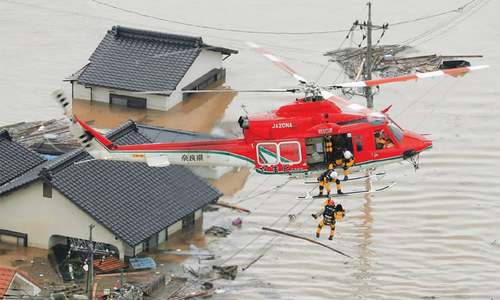NORIHISA Tomiyasu opened his first mortuary in 1997 aiming to clean up a profession he says deserved its bad reputation for exploiting people’s grief and overcharging them at some of the most fraught moments of their lives. “The industry was so backward,’’ he says.” I wanted to make it more socially responsible.’’
It turned out to be a shrewd career choice. Tomiyasu is founder and president of Tear Corp., a chain of discount funeral homes known for transparent pricing, whose share price has almost doubled since listing on the first tier of the Tokyo Stock Exchange in 2014.
The funeral business has a bright future in Japan, where deaths have outpaced births every year since 2007. Almost 30 per cent of the population is 65 or older. And this year is a tipping-point of sorts. After 2018, the number of Japanese women of child-bearing age will decline so sharply that by 2025 the population is forecast to drop by four million people, equivalent to the population of Los Angeles.
The slide gets even steeper by mid-century. “It’s one of Japan’s few growth industries,” says Tomiyasu, 57, who wears thick-rimmed glasses and exudes an optimism you might not expect from a funeral director. “Always be smiling” is one of his mottoes.
Tear is just one of 8,550 Japanese companies selling funerals and wakes. Yet by expanding to 98 locations, it has become the biggest in the city of Nagoya and the second-largest in Japan (just behind an Osaka-based company with much older roots, San Holdings Inc.).
What’s made Tomiyasu an innovator is his marketing strategy: he was the first in the industry in Japan to list prices on his website for all to see. Want a simple wooden altar and a basic service for family and close friends? That will cost the equivalent of $2,989 — dry ice, government paperwork and cremation included. More elaborate sendoffs, with flower arrangements and cosmetology for the deceased, bring the price closer to Tear’s average ticket, $9,240, which is thousands less than the industry average of $12,675.
Members who sign up in advance receive discounts of about 10 per cent. It’s an approach, now much copied, that makes a funeral no different than any other big purchase. “A lot of funeral home operators around the country saw Tear’s success and followed,” says Takuji Mitsuda, a management consultant at Funai Soken in Osaka. “They were ahead of the curve.”
The love of a reviled profession once cost Tomiyasu a marriage. While working for an ambiguously named business that performed both weddings and funerals, his fiancée’s parents were appalled to discover his work involved the part dealing with death rather than matrimony. Yet now, with aging such a preoccupation in Japan, the cultural taboos against planning for death — and working in the trade — are peeling away. The 2011 tsunami disaster factored in the national reckoning with mortality.

Tomiyasu says he found his calling when he was a teenager, working a summer job hauling funeral altars around for an undertaker. One day, after cleaning up from a ceremony, he watched a bereaved woman pay for her husband’s service, which had cost $30,000. Though the total was more than most people earn in many months of work, the woman bowed deeply and, with a voice full of feeling, said, “thank you, thank you, thank you,’’ as she handed over a thick stack of bills.
The woman’s gratitude shook Tomiyasu, but the strange economics of the transaction also left its impression, he says in his 2008 book, Why I Became an Undertaker. “The funeral business is probably the only business,” he explains, “where people pay and thank you for it.”
Later, though, he found that dynamic had a dark side. For many operators, up-selling was standard practice. Tomiyasu says he can remember arguing with an employer that they could afford to cut prices by half and still make a profit. “Funeral directors were pushing their product with no thought for people’s financial circumstances,” Tomiyasu said. “We’d steer people towards buying this or that, and after it all piled up, you’d be talking about a lot of money.’’
That’s not unheard of now, either. Data from Japan’s National Consumers Affairs Centre shows that as the country’s death count has climbed, so has the number of complaints lodged against funeral homes, jumping from 83 in 1996 to 724 in 2015. Excessive billing and unexplained costs were the most frequent claims.
Tomiyasu says he wants people to be able to ask questions, without shame. Last year, his morticians performed 13,465 ceremonies, a number that represents only about one per cent of the deaths that occurred in the country.
His expansion plan is simple: open a handful of new locations each year, using Japan’s Census data to pinpoint promising pockets of old people, which are everywhere.
By arrangement with Bloomberg-The Washington Post
Published in Dawn, July 9th, 2018














































Dear visitor, the comments section is undergoing an overhaul and will return soon.